
PHRONESIS-A JOURNAL FOR ANCIENT PHILOSOPHY
Scope & Guideline
Connecting Past Philosophies to Present Perspectives
Introduction
Aims and Scopes
- Critical Interpretation of Classical Texts:
The journal emphasizes rigorous analysis and interpretation of ancient philosophical texts, aiming to uncover nuanced understandings of foundational philosophical concepts. - Historical Contextualization:
Phronesis places significant importance on situating ancient philosophical ideas within their historical and cultural contexts, enhancing the understanding of their development and impact. - Engagement with Philosophical Themes:
Core themes such as ethics, metaphysics, epistemology, and political philosophy are recurrent, allowing for a comprehensive exploration of ancient thought. - Interdisciplinary Approaches:
The journal encourages interdisciplinary methodologies, integrating insights from history, linguistics, and literature to enrich philosophical inquiry. - Comparative Philosophy:
Phronesis often examines comparative aspects of ancient philosophies, such as the interactions between Greek and Hellenistic thought, fostering a broader understanding of philosophical evolution.
Trending and Emerging
- Reevaluation of Aristotle's Works:
There is a significant trend towards reevaluating Aristotle's contributions, particularly in ethics, metaphysics, and epistemology, suggesting a renewed interest in his foundational role in Western philosophy. - Exploration of Divine Foreknowledge and Free Will:
Recent papers have increasingly tackled themes of divine foreknowledge and free will, reflecting contemporary philosophical discussions on autonomy and moral responsibility. - Engagement with Metaphysical Issues:
A growing number of articles are focusing on metaphysical questions, including causation and the nature of existence, indicating a shift towards deeper exploration of foundational philosophical problems. - Interest in Ancient Ethical Theories:
There is a marked increase in discussions surrounding ancient ethical theories, particularly those related to virtue ethics, reflecting contemporary relevance and interest in moral philosophy. - Interdisciplinary Studies of Philosophy and Science:
Emerging themes include the intersection of ancient philosophy with scientific principles, highlighting how ancient thought can inform modern scientific discussions, especially in areas like biology and psychology.
Declining or Waning
- Focus on Earlier Pre-Socratic Philosophers:
There has been a noticeable decrease in papers dedicated to pre-Socratic thinkers, suggesting a waning interest in foundational figures like Heraclitus and Pythagoras in favor of more developed philosophical systems. - Less Emphasis on Rhetoric and Sophistry:
The exploration of rhetoric and sophistic philosophy has diminished, indicating a possible shift towards more systematic philosophical analysis rather than rhetorical critiques. - Reduction in Discussions of Neo-Platonism:
Although Neo-Platonism has historically been a significant area of focus, recent issues show fewer papers dedicated to this theme, possibly as scholars turn their attention to other strands of ancient thought. - Diminished Interest in Hellenistic Schools:
There appears to be a decline in articles addressing the Hellenistic schools, such as Stoicism and Epicureanism, which may reflect a broader trend of focusing on earlier classical philosophers. - Less Exploration of Ancient Cosmology:
The discussions surrounding ancient cosmological theories and their implications are less frequent, indicating a potential narrowing of focus towards more ethical and epistemological concerns.
Similar Journals

Themata-Revista de Filosofia
Cultivating a Global Discourse in PhilosophyThemata-Revista de Filosofia is an esteemed academic journal published by UNIV SEVILLA, EDITORIAL, dedicated to the exploration and dissemination of philosophical thought and inquiry. With a commitment to Open Access since 2008, it provides researchers, professionals, and students free access to high-quality, peer-reviewed articles that contribute significantly to the global discourse in philosophy. The journal aims to foster intellectual dialogue and engagement by presenting diverse perspectives across various philosophical disciplines, making it an essential resource for scholars seeking to deepen their understanding of philosophical issues. The ISSN 0212-8365 and E-ISSN 2253-900X ensure wide dissemination and accessibility, positioning Themata as a vital component of contemporary philosophical literature. Located in Seville, Spain, the journal also emphasizes its role in promoting philosophical studies within the European academic community.

Convivium
Connecting Minds Through Critical ResearchConvivium is a distinguished open-access journal published by the Universitat de Barcelona, Facultat Filologia, specializing in the field of philosophy. Since its inception, the journal has committed to fostering scholarly dialogue by providing a platform for innovative and critical research. Operating under an open-access model since 2007, Convivium ensures that its articles, which span a range of contemporary philosophical topics, are freely accessible to a global audience, thereby promoting the dissemination of knowledge. Despite facing challenges indicated by its current Scopus rank in the 2nd percentile of the Arts and Humanities, and its Q3 quartile in 2023, Convivium continues to thrive as an important resource for researchers, professionals, and students engaged in philosophical inquiry. With published volumes converging from 2009 to 2014, 2017 to 2018, and 2021 to 2023, the journal is poised to contribute significantly to the ongoing discussions and developments in philosophy.
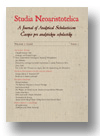
Studia Neoaristotelica-A Journal of Analytical Scholasticism
Illuminating the Path of Analytical ScholasticismStudia Neoaristotelica - A Journal of Analytical Scholasticism is a distinguished academic journal dedicated to the exploration and analysis of Aristotelian philosophy and its contemporary applications. Published by the PHILOSOPHY DOCUMENTATION CENTER in Germany, this journal seeks to foster scholarly discourse in the field of philosophy, particularly through the lens of analytical scholasticism. While it holds an impact factor placing it in the Q4 quartile within the philosophy category according to Scopus, the journal is committed to advancing philosophical inquiry from 2015 to 2023, positioning itself as a vital resource for researchers, professionals, and students alike. Although it does not currently offer open access, the journal ensures the dissemination of meaningful research that prompts critical thinking and contributes to academic debates within the discipline. As a platform for emerging voices and respected scholars, Studia Neoaristotelica aims to bridge historical philosophical concepts with modern analyses, making it an essential addition to the scholarly community.
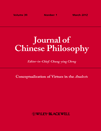
JOURNAL OF CHINESE PHILOSOPHY
Bridging Past and Present in Philosophical InquiryThe Journal of Chinese Philosophy, published by Brill, stands as a pivotal platform for the exploration and dissemination of research within the realm of philosophy, particularly focusing on traditional and contemporary Chinese thought. With a commitment to academic excellence, this journal has earned a reputation for its rigorous scholarship, as reflected in its Q2 category ranking in the field of Philosophy on Scopus, currently positioned at rank #337 out of 806 in Arts and Humanities. Since its inception in 1973, the journal has consistently engaged scholars, professionals, and students alike, featuring articles that deepen understanding and provoke critical discourse among various philosophical traditions. Although it is not open access, the journal's influential contributions and comprehensive reviews of emerging trends in Chinese philosophy make it an essential resource for anyone engaged in the study of this rich and diverse field. For subscription and access details, interested readers can refer to the publisher's website.
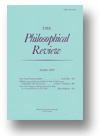
PHILOSOPHICAL REVIEW
Shaping Contemporary Thought Since 1970PHILOSOPHICAL REVIEW, published by DUKE UNIVERSITY PRESS, is a leading academic journal in the field of philosophy, recognized for its rigorous scholarship and impactful contributions to theoretical and applied philosophy. With an impressive Q1 ranking in the 2023 Scopus metrics, it places within the top percentile of philosophical journals, affirming its significance in the discourse. The journal, which has a rich publication history since its inception in 1970, focuses on a diverse range of philosophical topics, catering to a broad audience of researchers, practitioners, and scholars. Although it doesn't offer Open Access options, its articles remain highly sought after for their depth and quality. With a dedicated readership and a commitment to exploring fundamental philosophical questions, PHILOSOPHICAL REVIEW continues to shape contemporary philosophical thought and engage with pressing issues in various domains.
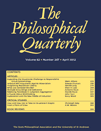
PHILOSOPHICAL QUARTERLY
Advancing the Frontiers of Philosophical ThoughtPHILOSOPHICAL QUARTERLY, a leading journal in the field of philosophy, is published by Oxford University Press, recognized for its commitment to advancing scholarly discourse since its inception in 1950. With an ISSN of 0031-8094 and an E-ISSN of 1467-9213, this prestigious journal is situated in the United Kingdom, reflecting a rich tradition of philosophical inquiry. The 2023 Category Quartiles rank it in the Q1 tier, demonstrating its substantial impact within the philosophy domain, supported by a Scopus rank of 130/806, placing it in the 83rd percentile of arts and humanities. While it does not currently offer open access, the journal remains a vital resource for researchers, professionals, and students seeking to engage with contemporary philosophical issues and theories. As it continues to publish insightful articles and critical discussions, the PHILOSOPHICAL QUARTERLY stands as a testament to the ongoing evolution and relevance of philosophical scholarship.

History of Philosophy & Logical Analysis
Engaging with the Legacy of Philosophical ThoughtHistory of Philosophy & Logical Analysis, published by BRILL, is an esteemed journal dedicated to the exploration and critical examination of philosophical thought and its logical structures. With an ISSN of 2666-4283 and an E-ISSN of 2666-4275, this journal serves as a vital platform for scholars in the fields of philosophy and the history of science. Based in the Netherlands, at Plantijnstraat 2, P O Box 9000, 2300 PA Leiden, Netherlands, the journal operates without open access, ensuring a curated selection of high-quality research outputs. Recognized for its scholarly impact, it holds a Q3 ranking in *History and Philosophy of Science* and a Q2 ranking in *Philosophy* as of 2023. Covering a broad spectrum of topics related to logical analysis and philosophical inquiry, the journal aims to connect contemporary philosophical debates with historical perspectives. It supports researchers, professionals, and students alike in their quest for knowledge and understanding within these critical domains.
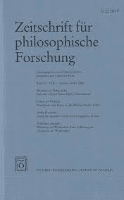
ZEITSCHRIFT FUR PHILOSOPHISCHE FORSCHUNG
Advancing Scholarly Discourse in Philosophy.ZEITSCHRIFT FUR PHILOSOPHISCHE FORSCHUNG is a prestigious academic journal published by Vittorio Klostermann GmbH in Germany, dedicated to the interdisciplinary field of philosophy. With its ISSN 0044-3301 and E-ISSN 1439-2615, this journal has made significant contributions to the philosophical discourse since its inception in 1977, continuing its pursuit of excellence in scholarship through 2024. Recognized in the 2023 category quartiles as Q2 in Philosophy, it is ranked #498 out of 806 in the Arts and Humanities' Philosophy classification by Scopus, placing it in the 38th percentile. Although it currently does not offer open access options, its rigorous peer-reviewed articles serve to enrich the scholarly community's understanding of complex philosophical issues. ZEITSCHRIFT FUR PHILOSOPHISCHE FORSCHUNG plays a vital role in advancing philosophical research in a collaborative academic environment, making it a valuable resource for researchers, professionals, and students alike.

GIORNALE CRITICO DELLA FILOSOFIA ITALIANA
Exploring the Depths of Italian ThoughtGIORNALE CRITICO DELLA FILOSOFIA ITALIANA is a prestigious journal founded in 1966, published by CASA EDITRICE G C SANSONI SPA in the cultural heart of Florence, Italy. With an emphasis on exploring the rich tradition of Italian philosophy, it provides a critical platform for scholarly articles, discussions, and insights into philosophical discourse. Although it currently holds a Q4 classification in the philosophy category and is ranked 706 out of 806 in the Scopus Arts and Humanities _ Philosophy sector, the journal remains dedicated to fostering academic dialogue and advancing philosophical thought. The journal's unique historical perspective, combined with its commitment to publishing rigorous research, makes it an essential resource for researchers, professionals, and students keen on Italian philosophical heritage. Access to this journal is available through institutional subscriptions, ensuring its valuable content is accessible to those engaged in the philosophical community.

Archai-Revista de Estudos Sobre as Origens do Pensamento Ocidental
Engaging Minds in the Study of Cultural Origins.Archai-Revista de Estudos Sobre as Origens do Pensamento Ocidental is a distinguished academic journal published by UNIV BRASILIA in Portugal, dedicated to exploring the origins of Western thought through various interdisciplinary lenses. Since its inception, the journal has embraced Open Access publishing, ensuring that a broad audience can access its rich pool of research and discourse. Covering a wide range of subjects, including Archeology, History, Philosophy, and Social Sciences, it fosters scholarly dialogue and insights that contribute to our understanding of cultural and intellectual developments. Despite its current categorization in the fourth quartile across various disciplines as of 2023, the journal remains committed to expanding its impact in the humanities and social sciences fields. As it converges from 2019 to 2024, Archai invites researchers, professionals, and students alike to engage with innovative thinking and critical analyses that shape discourses on Western philosophical traditions.